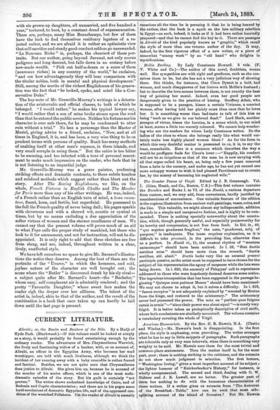The Greater Poems of Virgil. Edited by J. B. Greenough.
Vol. L (Ginn, Heath, and Co., Boston, U.S.)—This first volume contains the Bacolics and Books I. to VI. of the 2Eneid, a curious departure from custom, and, we may add, from correctness, hardly justified by considerations of convenience. One valuable feature of the edition is the copious illustration from ancient wall-paintings, vases, coins, and the like. This valuable, we might almost say indispensable, addition is made in a simple and inexpensive fashion, and is highly to be com- mended. There is nothing specially noteworthy about the annota- tion, which, though generally useful, and especially praiseworthy for its brevity and compression, is not free from fault. In Ecl. ix., 48, "quo segetes gauderent frugibus," the note, "gauderent, subj. of purpose," is inadequate. The tense requires explanation, as it is difficult to take processit, in the preceding line, otherwise than as a perfect. In tEneid vi., 11, the unusual rhythm of " mentetn animnmque " should have been noticed. In 1. 22, " Stat ductis sortibus urna " should have more than the remark, "ductis sortibus, abl. absol." Ductis looks very like an unusual present participle passive, as the artist must be supposed to have chosen for the subject of his representation the agony of suspense while the lots were being drawn. In 1. 620, the anomaly of Phlegyas' call to repentance addressed to those who were hopelessly doomed deserves some notice. The ingenious transposition that has been suggested in the passage be- ginning " Quisque snas patimur Manes " should have been mentioned- We may not choose to adopt it, but it solves a difficulty. In 1. 818, " fasces receptos " is not adequately explained by " wrested by Brutus from the kings, and restored to the aristocracy." The aristocracy never had possessed the power. The note on " paribus quas fulgere cernis in armis"—"since their power was about equal "—is surely very frigid. It is better taken as proleptically descriptive of civil strife, where both combatants are similarly accoutred. The volume contains- a vocabulary covering the whole of Virgil.


































 Previous page
Previous page